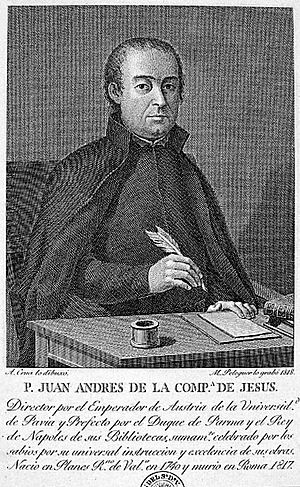Juan Andrés facts for kids
Juan Andrés y Morell (born February 15, 1740, in Planes, Alicante, Spain – died January 12, 1817, in Rome, Italy) was a very smart Spanish priest and writer. He was a Christian humanist, meaning he believed in human potential and learning, while also being deeply religious. He was also a literary critic, someone who studies and judges books and writing.
Juan Andrés lived during the Age of Enlightenment, a time when people were very interested in new ideas, science, and learning. He is famous for creating the idea of studying world history and comparative literature. This means looking at how literature and science developed across different countries and cultures. His most important work was a huge book called Dell'Origine, progressi e stato d'ogni attuale letteratura (which means The Origin, Progress, and Present State of All Literature). This book was one of the first to look at knowledge from a global perspective.
Juan Andrés was part of an important group of thinkers called the Spanish Universalist School of the 18th century. Other famous members included Lorenzo Hervás, Antonio Eximeno, Francisco Javier Clavijero, and Celestino Mutis.
Who Was Juan Andrés?
Juan Andrés was seen as an incredibly smart person in Europe during his time. However, for a long time after he died, many people didn't remember his work.
He studied at the old University of Gandia. He became a professor of Rhetoric, which is the art of speaking or writing effectively. As a young Jesuit priest, he was forced to leave Spain in 1767 and move to Italy.
He first lived in Ferrara. Later, a kind nobleman called the Marquis of Bianchi invited him to live in his palace in Mantua. Juan Andrés spent more than 20 happy and productive years there. During this time, he wrote most of his major works. He stayed there until Napoleon arrived in Italy.
Juan Andrés's Writings
Besides his huge work on world literature, Juan Andrés wrote many other books. One important Spanish book he wrote was Family Letters, (Tour of Italy). This book was like a travel diary, filled with his thoughts on literature, science, and books he found during his travels. It became a very important European work of its kind.
Juan Andrés's ideas fit well with the late neoclassical period of the Enlightenment. He was strongly influenced by other Spanish and Italian thinkers, especially his fellow Jesuits who were also forced to leave Spain. These included Lorenzo Hervás, who helped create comparative linguistics (the study of how languages are related), and Antonio Eximeno, a great music expert. These three were seen as the core of the 18th-century School of Spanish Universalists.
Later in his life, Juan Andrés's eyesight became very poor. His last job was in charge of the Royal Library of Naples. He eventually died in Rome, still under the care of his religious group.
See also
 In Spanish: Juan Andrés para niños
In Spanish: Juan Andrés para niños
Images for kids
 | Dorothy Vaughan |
 | Charles Henry Turner |
 | Hildrus Poindexter |
 | Henry Cecil McBay |



